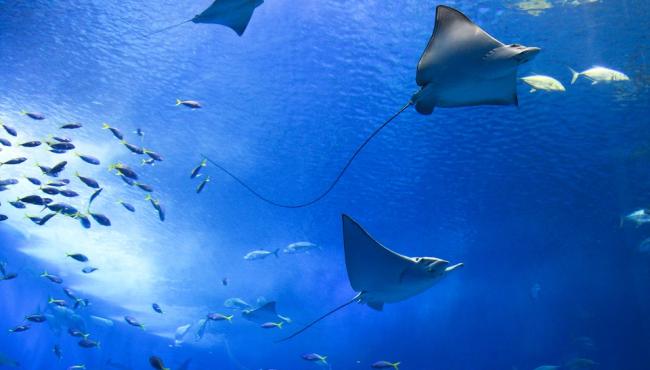The Kigali Declaration of 5 March 2022 - outcome of the Eighth African Regional Forum on Sustainable Development - urged African countries to support the Great Blue Wall (GBW) initiative to build climate-resilient societies and economies in the region.
The marine and coastal areas along the eastern coast of Africa contain a very rich flora and fauna, unique for its biodiversity. The region hosts pristine coral reefs, carbon-rich mangrove forests and sheltered seagrass beds, which support an abundance of marine life, including important fish species, sharks and rays, turtles, sea birds and marine mammals.
With over 70 million people living along the coast, artisanal and commercial fishing is critical for food security and the economy. It contributes to 4.8% of the global fish catch, equivalent to about 4.5 million tons of fish per year. Marine assets in the West Indian Ocean region (WIO) are valued conservatively at $333 billion and provide at least $21 billion every year to the regional economy from marine and coastal tourism, carbon sequestration and fishing.
As the deterioration of the WIO accelerates, we are seeing dramatic impacts on human societies, particularly on coastal communities, including food insecurity, rising sea levels and storm surges. Other growing threats include uncontrolled coastal development, deforestation of mangroves, illegal, unreported and unregulated fishing, maritime traffic, overexploitation of resources, destructive fishing practices, unregulated tourism, oil and gas exploration and heavy sand mining. These growing pressures have already resulted in the loss of unprotected coral reefs, mangroves, seagrass beds and fish stocks, which will continue to undermine local livelihoods and erode the WIO's blue economy.
The deterioration also has wider global implications. The IUCN estimates that when coastal ecosystems like mangroves, salt marshes and seagrasses are degraded at the global level, lost or converted, massive amounts of CO2 — an estimated 0.15-1.02 billion tons every year — are released into the atmosphere or ocean, equivalent to about 19 percent of global carbon emissions from deforestation.
Making large-scale marine conservation work for both nature and people
Given their dimension and untapped potential, oceans represent a powerful lever to address many global economic and ecological challenges. A Regenerative Blue Economy (RBE) represents a framework for sustainable use and conservation of marine and coastal resources and ecosystems. It is, on the one hand, a set of human activities that produces and distributes goods and services derived from coastal and marine ecosystems. These activities are organized in an integrated, fair and circular manner for the sustainable use of aquatic resources (fisheries, biotechnologies, alternative energies, etc ) and/or assets that constitute aquatic environments, such as maritime transport and coastal tourism. On the other hand, RBE is also a set of human activities that improve the health status of coastal and marine ecosystems through protective and restorative measures.
The GBW initiative, an opportunity for large-scale action
The GBW is an Africa-led roadmap to achieve a nature-positive world, that enhances planetary and societal resilience to halt and reverse nature loss by 2030. More specifically, the proponents of the GBW aim to create interconnected and protected marine areas to counter the effects of climate change and global warming in the WIO region, initially, and across the continent, subsequently, by unleashing the potential of the blue economy to become the engine of nature conservation and sustainable development. These regional ecological corridors are intended to serve as a buffer against the effects of climate change and loss of biodiversity, as well as to shelter coastal communities.
In terms of figures, the GBW ambition is to protect 2 million km2 of marine areas, restore 2 million hectares of critical coastal and marine ecosystems and thus help sequester 100 million tons of CO2 and create 10 million blue jobs by 2030.
A regional response to the challenges of climate change
To guide this effort, the GBW initiative intends to support the development of critical regional ecosystem conservation and restoration strategies and action plans to enhance activities and impact on the ground, as well as enable the region to sequester 100 million tons of (blue) carbon while building ecosystem-based adaptation and socio-ecological resilience.
Africa has an opportunity to change its ocean protection narrative. The GBW could represent the needed paradigm shift in development to achieve a nature-positive world by 2030, making it a driver of natural regeneration, while unlocking blue economy and sustainable livelihood opportunities and empowering local communities and stakeholders to become the stewards of our ocean.
Ultimately, the GBW is here to tell a story. A story of countries rising up to unprecedented challenges and building an unprecedented solution.



Add new comment